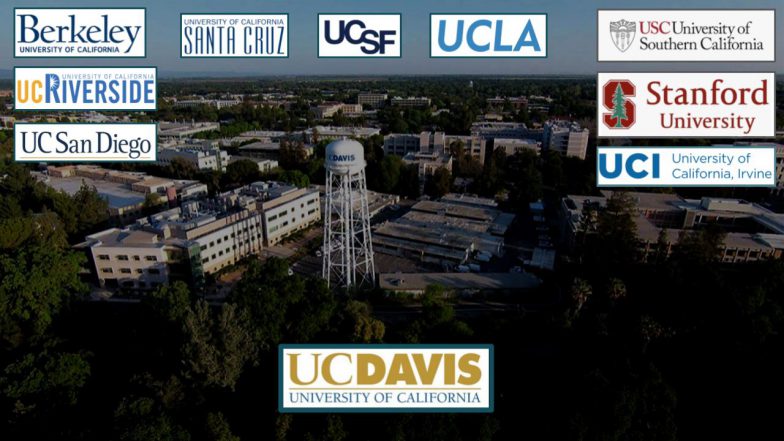Summary
The US onAir Network will be working with volunteers from California universities, colleges, and nonprofit organizations to oversee the curation and moderation of posts, aircasts (online discussions), and in person events for the California onAir Hub … related to federal, state, and local elections and government.
Our first outreach will be to UC Davis partly because of its proximity to the state capital. We have identified many of UC Davis’s civic engagement, academic, internship and research programs related to making democracy and civic responsibility a focus of higher learning on their campus … for students, faculty, staff, and local community. This post, over time, will have similar information on other collaborating organizations in the state.
Contact ben.murphy@onair.cc for more information on how to involve your organization.
About
The UC Davis onAir chapter will initially focus on training interested undergrad and graduate students on how to curate California onAir content especially submitting Top News articles, events, videos, and information and moderating forums in each post they curate.
Student curators will also work with state senate and house committee chairs to produce aircasts on issues being discussed and bills being proposed in their committees.
During election season, students with other other organizations like the League of Women Voters, will coordinate and produce aircasted debates with candidates.
The UC Davis onAir chapter will also help to establish other onAir chapters at public and private universities and colleges throughout the state.
UC Davis
Source: About Us
UC Davis was founded in 1908 to serve the state of California. We do and we always will. And today, the seed that was planted those years ago has grown into one of the world’s top universities.
Center for Community and Citizen Science
Source: Center website
The Center for Community and Citizen Science is partnering with Public Lab to see what we can learn about a global community of individuals bridging science learning, civic engagement, and environmental advocacy.
Our specific projects (read more on these below) all contribute to a broader set of questions about the institutional landscape of citizen science, community science, and the communities contributing to open science and technology solutions to environmental problems. In that sense, our partnership is an exploration of the roles that different organizations can play in advancing research, best practices, and values such as empowerment, democratization, equity, and justice.
Student Government
Source: ASUCD
Units
ASUCD provides programs and services to its students based on four pillars: basic services, media, advocacy, and social. ASUCD units employ hundreds of student employees who work hard to provide each and every student with the programs and services they need to thrive and succeed at UC Davis. Each unit, with its own unique mission, helps us build tomorrow, together.
Commissions
Seven commissions advise the ASUCD Senate to ensure that all student interests are represented within ASUCD. In addition to advising the Senate, commissions also plan events and activities relevant to their field of expertise to educate the student body.
Commissions hire new members at the end of Fall and Spring Quarter of each academic year, although vacancies may occur throughout the year as well. Each commission has nine voting members and up to four alternate members.
Committees
Committees delegate responsibilities of the ASUCD Senate into smaller portfolios in order to efficiently handle administrative roles and tasks. Each committee performs administrative functions and has a scope pertaining to its field of expertise. Most committees consist of members of the ASUCD Senate, Commissions chairs, and career staff.
Internships
Source: Department of Political Science
Internships in the Department of Political Science
Internship credits are available to students during Fall, Winter, and Spring terms through a faculty-supervised POL 192A/B class. These two courses allow students to earn a flexible number of units for up to two quarters. There is no in-person or virtual weekly class. Coursework is administered through Canvas and the Faculty Supervisor communicates directly with students. POL 192A/B units cannot be earned without participating in this class.
An internship may qualify for academic credit if:
- Students are able to apply the concepts and methods of one or more academic disciplines to an appropriate work experience or field setting;
- Students are able to grow intellectually by extension of the general intellectual tools of one or more academic disciplines to the workplace; and
- Faculty sponsors are able to assess the quality of academic work that the student completes.
Political Science Programs
Source: Department website
Undergraduate
The UC Davis Department of Political Science offers three specialized, focused undergraduate majors: Political Science, Political Science – Public Service, and International Relations.
Careers for Political Science and IR Majors
Graduate
The goal of our doctoral program is to train graduate students to become accomplished scholars and teachers in the field of political science.
Research Initiatives
Source: Department of Political Science
Research Groups
The UC Davis Department of Political Science hosts or is affiliated with several research groups through which faculty and student researchers collaborate in advancing insights and knowledge.
Political Science Research Workshop
Running Dog Methodology Reading Group
Social and Political Interacting Networks
Omnibus Program of Experimental Research
The Omnibus Program of Experimental Research is an experimental research program, run by the Department of Political Science, that coordinates the use of undergraduate participant pools for political science experiments either in our experimental labs or using online tools. Our goal is to advance empirical research in political behavior while also enriching the learning environment for the faculty, graduate students and undergraduate students.

